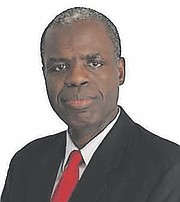By NEIL HARTNELL
Tribune Business Editor
nhartnell@tribunemedia.net
The Central Bank yesterday confirmed that Bahamians will be able to resume purchasing overseas securities and real estate from October 1 after seeing a sufficient uptick in tourism-related foreign currency inflows.
John Rolle, the regulator’s governor, confirmed to Tribune Business in an e-mail that the rebounding economy and increasing external inflows had given it sufficient confidence to remove the COVID-19 related restrictions on the foreign currency market.
These will have been imposed for almost 15 months since their introduction on May 4, 2020, as part of measures to conserve The Bahamas’ all-important foreign currency reserves that protect the one:one peg with the US dollar.
Mr Rolle said the relaxation had less to do with the recent allocation of some $247m in so-called additional Special Drawing Rights (SDRs) to The Bahamas by the International Monetary Fund (IMF), and was more connected to the resumption of stabilised foreign currency inflows from traditional generating industries such as tourism.
He explained: “Although the IMF SDR allocations provide some important support for the timing of the decision, the Central Bank placed more reliance on the improved resumption of receipts from tourism.
“These represent expanded foreign exchange inflows through the private sector that can sustain more of the private sector’s demand for eternal investments. The SDRs are a one-off boost to the reserves, but the private flows are an improving steady stream of resources. Our recent statements on the economy spoke to such private sector-driven improving conditions for foreign exchange.
“The Central Bank still has the tools at its disposal to manage access to foreign exchange if pressures become unsustainable. But the outlook does not warrant such at present. At the same time this relaxation of access to foreign exchange does not change our assessments of the protracted travel sector-dependent path to a full recovery of the economy. However, access need not remain as restricted was necessary when tourism was at a virtual shutdown.”
Besides individual Bahamians being able to access foreign currency for overseas investments in securities and real estate via the Investment Currency Market (ICM), broker/dealers will also be able to restart their Bahamian Depository Receipt (BDR) initiatives to give investors access to overseas markets via the creation of investment funds.
Just $8.75m will be made available for BDR initiatives in the 2021 fourth quarter, as the annual amount made available for such investments is capped at $35m. The latter limit will again apply beginning on January 1, 2022.
The Central Bank said: “The ICM and BDR programmes facilitate residents’ purchase of foreign securities and, to some extent, foreign real estate, provided application is made to the Central Bank and approved. ICM operations are delegated, to a significant extent, to commercial banks.
“Residents are permitted to buy and sell foreign exchange through the market at the respective premiums of 5 percent and 2.5 percent above the official rate of B$1 = $1US. The BDR programme grants access at the official rate, allowing publicly traded foreign securities to be listed through depository receipts on the Bahamas International Securities Exchange (BISX).
“Residents acquire B$ interest in the receipts, while sponsoring broker/dealers, are authorised to conclude the external side of the transactions. On an annual basis, up to 5 percent of the external reserves at previous year’s end, but not exceeding $35m, is allocated to the participating broker/dealers.”
Mr Rolle had earlier this year said the Central Bank will “be able to provide a clear signal” by the 2021 third quarter on when it will ease restrictions preventing Bahamians from making up to $100m per year in overseas investments via the ICM and BDR mechanisms.
His timing forecast has thus proven spot on, and he also earlier suggested that these specific restrictions had conserved some $100m in external reserves at the COVID-19 pandemic’s peak.
Signalling as recently as early August that the restrictions will be lifted, Mr Rolle said: “Taking account of the improved foreign exchange market conditions, the Central Bank has already removed the majority of the conservation measures that were introduced in 2020.
“The remaining measures relate to capital market investments, principally through the local broker/dealers or securities market firms, and the investment currency market. These restrictions are under review for timing that would see them removed before the end of 2021.”
He added: “I believe, looking from the start of the pandemic to the point at which we saw the Government’s financing activity start, we estimate there’s at least $200m-plus of cushion that we provided to the foreign reserves over that period.
“The banking sector measures added close to $100m in cushion. In ordinary year, and given the trends, you’re looking at close to $100m in transactions that happen by way of investment by residents abroad. We’d have received some conversion from NIB that was substantial. That added to the reserves.”






Comments
Use the comment form below to begin a discussion about this content.
Sign in to comment
OpenID